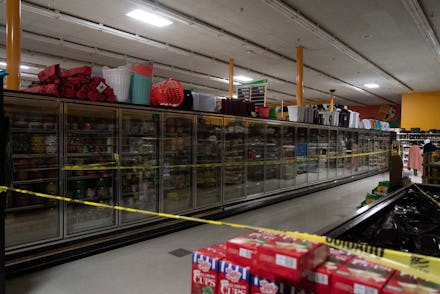Here’s what the government is doing — finally — to help Texans in need

It's been several days now since a catastrophic winter storm crippled Texas's power grid, leaving millions without electricity and heat. In that time, at least 36 people have died in what is officially a statewide disaster, with countless more worrying about their health and safety as a state that has proudly touted its energy independence is now left to grapple with the consequences of years of undervaluing and undermining the very institutions that could have protected residents against the devastating effects of this crisis.
Some state leaders — like former governor-turned-Trump administration energy secretary Rick Perry — essentially declared that affected state residents should eat cake rather than accept federal aid. Others attempted to shift the blame away from the obvious truth of their state's failures and onto the horrifying bogeyman of "sound environmental policies." Ted Cruz just peaced out entirely.
But after days of excuses, confusion, and untold human suffering, help is starting to trickle into the Lone Star State. On Thursday morning, Dan Woodfin, the senior director of system operations at the Electric Reliability Counsel of Texas (ERCOT) cautiously offered a glimmer of optimism. Woodfin said that just 500,000 residents were still without power — still not good, but down significantly from the calculated 3 million who were without power just one day earlier.
"We really feel like we're on a right path," Woodfin said. "If we do hit a bump and have some generators have to come back off, we may have to ask for outages. But if we do, we believe they'll be at the level where they could be rotating outages, not the larger numbers we faced this week."
And while state power officials scramble to get Texas's electric grid back to pre-storm capacity, the Biden administration has also begun unlocking federal aid to help provide lifesaving emergency gear for struggling Texans. On Monday, President Biden approved an emergency declaration for the state, opening the doors for the Federal Emergency Management Agency to begin moving power generators, blankets, and water into at-risk zones. FEMA has already reportedly dispatched 60 "very large" generators intended to keep crucial sites such as hospitals running. White House Press Secretary Jen Psaki also announced this week that the agency would send diesel fuel to the state in order "to ensure the continued availability of backup power."
In addition to FEMA supplies, the government has reportedly begun the process of dispatching active duty military personnel to help facilitate Texas's ongoing — and since disrupted — coronavirus vaccination effort.
Despite conspicuously shirking any sense of responsibility for putting Texas in a position where a single untimely storm could cause this much damage, Texas state officials have also begun moving to get their communities back up and running. At a Wednesday press conference, Republican Gov. Greg Abbott announced plans to direct Texas's natural gas providers to sell their product to in-state power generators while ERCOT works to re-operationalize the state's power grid. Abbott also said Texas would begin approving temporary plumbing licenses for out-of-state contractors as part of an effort to speed repairs to the state's damaged water system, which has left millions of residents to boil their tap water in order to make it safe for consumption.
While Texas is far from out of the woods, drips and drabs of help on both the state and federal levels are slowly starting to reach communities in need. Is it too late? For much of the state, yes it is. And perhaps more pressingly: Does FEMA aid and plumbing license adjustments address the catastrophic climate change behind this latest environmental disaster? Not even a little.